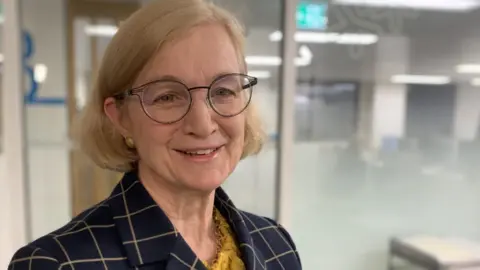Staff crisis holds children back post-Covid - Ofsted
 BBC/Kate McGough
BBC/Kate McGoughChildren's education post-pandemic is being held back by staff shortages, the schools' regulator for England says.
Ofsted warns recruitment remains a frustration for schools - and there's been a sharp drop in foster carers too.
Delays to support for children with special educational needs are also an "acute concern", Ofsted's chief inspector has told the BBC.
The Department for Education says it has invested £5bn in education recovery.
Ofsted's annual report looks back at inspections carried out over the previous academic year across children's social care and education providers.
The report says schools are seeing shortages of teaching assistants, and colleges are finding it difficult to recruit tutors. Nurseries have closed as the early years sector loses staff to higher-paid jobs.
Chief inspector Amanda Spielman warned that the pandemic continued to "cast a shadow" over education and children's social care for most of last year.
"It's clear that in education - and in children's social care - staffing issues are compounding problems standing in the way of a full recovery.
"It's vital that education and social care providers are able to recruit, train and retain talented and capable people."
The report warns that managing with fewer staff has delayed the return of sports, drama, music and other enrichment activities.
The other major issue highlighted in the report was support for children with special educational needs and disabilities (SEND).
More than half of the local authorities inspected by the regulator were required to produce a written statement of action over "significant weaknesses" in their special needs provision.
'Childhood is short'
Nearly 1.5 million school pupils are currently identified as needing SEND support in England, an increase of almost 77,000 since last year.
Of these, around 355,000 children have an education, health and care (EHC) plan. These plans are legally binding documents to make sure children with the most complex needs get the support they're entitled to.
It should take local authorities a maximum of 20 weeks to decide whether to issue an EHC plan once a school or parent has applied.
But Ofsted says only 60% of all EHC plans are being issued within that 20-week limit. Twenty local authorities are particularly slow, with just one third of plans being issued in that time.
Ofsted chief inspector Amanda Spielman told the BBC these delays were her "most acute concern".
"Childhood is short. A child who clearly has some significant problems, the faster they can be understood, the faster the right support can be in place, the greater the chance there is of minimising the effect that those problems have on that child's education and their adult life," she said.
"A prompt response is the critical thing for me."
Abi Horsfield's first application to get an EHC plan for her son Casey was rejected, despite Casey having a diagnosis of Autism spectrum disorder and Dyslexia. She applied again and was eventually successful, but only after waiting around eight months for the process to complete.
Abi said it was a "really difficult and really emotional process".
"When you get your rejection letter it clearly states that you're on your own as a parent now, that even if the school have applied initially, you have to take it forward as a parent.
"The process needs to be more user-friendly... and support should be out there for every child that needs it."

Ms Spielman said the SEND system is struggling to cope with increased demand since the pandemic.
"Delays and backlogs have built up. It's hard getting children assessed, it's hard getting them the right specialist services," she told the BBC.
"Families are getting frustrated and some of them are turning to private assessment. Schools are sometimes picking up the gaps themselves out of their own budgets with things like speech therapy. It's a system that's leaving a lot of people unsatisfied at the moment."

What else is in Ofsted's annual report?
- Pupils' mental health - long waiting lists for external support has put an extra burden on schools
- Covid-related staff absence - a shortage of supply teachers means many schools have used their own staff to cover absences
- Drop in foster carers - the number is at its lowest point in years
- Pupil absence levels still high, particularly in SEND - a third of pupils with EHC plans missed 10% of lessons in the autumn term last year
- Bad behaviour - the report says children are being put on part-time timetables as teachers struggle to control bad behaviour after the pandemic.

Ofsted is changing the way it inspects special needs provision for local areas jointly with the Care Quality Commission from January next year. Ms Spielman said it will focus more sharply on the experiences of children and young people "to make sure we really crystallise who is responsible where improvements need to be made - so there is no uncertainty coming out of these inspections about who needs to do what".
Education Secretary Gillian Keegan has said the government will publish updated plans to improve the SEND system early next year.
The Department for Education said it's investing £400m in high-needs budgets next year and is training thousands of new social workers.
A spokesperson added: "We have put in place a wide range of support, including investing £5 billion in education recovery, with over two million tutoring courses now started, and are boosting school budgets to their highest-ever level in real terms by 2024/25."
